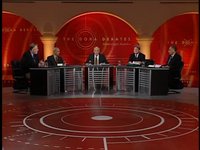This House believes it is time to talk to Al Qaeda
Wednesday September 05 2007
MOTION PASSED
by 63% to 37%
Transcript
Order of speeches
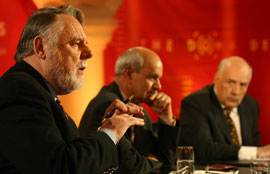
Introduction
 TIM SEBASTIAN
TIM SEBASTIAN
Ladies and gentlemen, a very good evening to you and welcome to the first in our new series of the Doha Debates coming to you from the Gulf state of Qatar and sponsored by the Qatar Foundation. Governments in the West insist they don't talk to terrorists. But history would suggest otherwise. The British Government used to have secret meetings with the IRA, the Spanish with ETA and Nelson Mandela once reviled as a terrorist by prominent politicians has just had a statue unveiled in London. So should governments engage with the men of violence in this region? That's the question underlying our motion tonight: 'This House believes it is time to talk to Al Qaeda.' Well, speaking in favour of the motion, Terry Waite, once the envoy of the Archbishop of Canterbury. He made a name for himself getting hostages freed in the Middle East. But in 1987 his own luck ran out. He was abducted in Lebanon and held captive for four years, most of the time in solitary confinement. He now fills his days lecturing, writing and broadcasting. With him Asad Durrani who rose sharply through Pakistan's military establishment to become Head of its intelligence agency, the ISI. He retired from that world in the nineties only to become a diplomat, serving his country as an ambassador to Germany and Saudi Arabia. Well, against the motion is Laith Kubba, spokesman for one of Iraq's recent Prime Ministers Ibrahim Al-Jaafari. Born in Baghdad he is now senior director for Middle East and North Africa at the National Endowment for Democracy - a think tank based in Washington. And with him Adam Holloway who has been both Special Forces Officer, fighting in the first Gulf War, then a television journalist covering the conflict in Bosnia. These days he gets to eat at the British House of Commons as a conservative Member of Parliament, where he sits on the influential Defence Select Committee. Ladies and gentlemen: our panel. And now let me call on Terry Waite, first of all, to speak for the motion.
Terry Waite
Speaking for the motion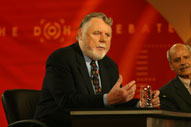
TERRY WAITE
I'd like to begin by making what I believe to be four very simple, straightforward points. First of all, to say that my own position is that I do not in any way support acts of violence that cause death or injury to innocent people. And I believe that war should be an absolute last resort. Those who bomb from 50,000 feet or blow up buildings on the ground are both dealing in death and I condemn that. Secondly, when we look at the issue before us tonight, we need to be able to ask who is Al Qaeda? In my view it is an organisation that has been granted a greater organisational capacity than it in fact has. But it is in my view the extreme edge of insurgency in the Islamic World. Thirdly, when we look at the evidence, as was suggested in the introduction, for dialogue we have overwhelming evidence of that in fact dialogue is the way to resolve problems. The IRA, the PLO, the ANC and of course very recently on a different scale with North Korea with Christopher Hill's negotiations. And also in the last few days in Finland when two unlikely characters Martin McGuinness and Ian Paisley sat down with Shia and Sunni representatives from Iraq to enter into dialogue - unthought of a year ago. Finally, I cannot think of an insurgency or terrorist movement that has been defeated by bombing and warfare. My own experience in Lebanon, in Iran and in Libya has actually demonstrated the fact that you can talk to people whose stated position seems to be impossible, but you can talk to them. I know that from personal experience. Terrorism is a symptom. It's not a root issue. You must deal with the root issue. And the only way to deal with the root issue is not to drive people against the wall by bombing and fighting but by entering into dialogue. To conclude, Churchill said 'jaw-jaw', meaning 'speak', rather than war-war. And I agree with Churchill. Let us talk rather than engage in fighting.
TIM SEBASTIAN
Terry Waite, thank you very much indeed. Well, Churchill as we all know did engage in fighting in the Second World War for six years and won it. So doesn't that put a lie to your argument?
TERRY WAITE
No, it doesn't at all. And I think...
TIM SEBASTIAN
Do you find much to talk to Nazi Germany about until they have been defeated?
TERRY WAITE
Very different situations. We are talking now...
TIM SEBASTIAN
Well, you raised it, so I followed up...
TERRY WAITE
Yes indeed we are talking now about so-called terrorist organisations which are very different than the situation in Nazi Germany
TIM SEBASTIAN
All right, why talk to them now? Why talk to Al Qaeda now?
TERRY WAITE
What we have to say is that Al Qaeda is a name that covers a multitude of activities and...
TIM SEBASTIAN
Including beheading people on television?
TERRY WAITE
And indeed it does...
TIM SEBASTIAN
... And you think you can find common ground with people who do that?
TERRY WAITE
The more you engage in warfare, the more you encourage the extremists.
TIM SEBASTIAN
Could you just answer my question? Can you find common ground with people who behead other people on television?
TERRY WAITE
I think you have to find a way through the situation of dealing with the extremists.
TIM SEBASTIAN
What does that mean? You sit down without preconditions with people who cut off other people's heads...
TERRY WAITE
Right, let me say this. In my view by engaging in warfare in Iraq for example, we created a situation which in fact encouraged extremism because it gave the extremist an opportunity to say to impressionable young people, look this is how the West behaves come and join ...
TIM SEBASTIAN
So you can just finesse what they have done and you reward the violence and give them a seat at the table because they crashed two planes into the World Trade Centre?
TERRY WAITE
I don't think it is just rewarding violence because I think it takes a great deal of courage, perseverance to engage in dialogue. Take for example the situation...
TIM SEBASTIAN
No preconditions to dialogue?
TERRY WAITE
Take for instance the situation...
TIM SEBASTIAN
Could you just answer the question? No preconditions to sitting down with Al Qaeda? No preconditions?
TERRY WAITE
I think you sit down and you determine together where the common ground is. And it is very often possible to find common ground. Just let me give this example. John Major entered in, through his government, entered into discussion with the IRA. Now, he continued the discussions even though the IRA, or elements in the IRA, were conducting atrocities and blowing people up. But he continued that discussion. Now...
TIM SEBASTIAN
All right...
TERRY WAITE
It took a great deal of courage to do that...
TIM SEBASTIAN
Terry Waite, thank you very much indeed.
Laith Kubba
Speaking against the motion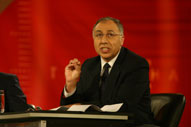
TIM SEBASTIAN
Now, let me ask Laith Kubba please to speak against the motion..
LAITH KUBBA
Please do not confuse your minds about what Al Qaeda is. It is fundamentally different from any other group, whether it uses political violence, whether it is an extremist religious group, a Taliban, an IRA. This is fundamentally different. Al Qaeda is nothing but a death machine. Its actions speak louder than its words. Look at its trail. The trail of death that it has left in Iraq where I witnessed over 3,000 car bombs went indiscriminately in public places: markets, schools, banks, hospitals, mosques, Shias and Sunnites alike. 99% of the victims of these bombs are innocent bystanders. 99% of Al Qaeda's victims all over the world happen to be Muslim. The fact that they use a twisted ideology, a twisted theology, simplistic ideology to appeal to the frustration of the youth in Muslim countries will make that more of a dangerous machine. Any attempt to lend them an air of legitimacy or space to grow by talking to them will certainly bring harm and will not bring any good. Normally with any group that is terrorist, labelled terrorist or uses violence, it has a local specific agenda and it wants engage or achieve some goals. The goals of Al Qaeda are totally unachievable. They want to annihilate anybody who is in their way, our way or hell way and they have demonstrated that. What we have begun to see of Al Qaeda is nothing but the beginning of the destruction. They are nothing other than a cancer - a cancer cell that looks like a human cell but spreads to one end alone: to cause death. I do believe even in this debate tonight your vote will matter. This is a challenge that is facing Muslim countries in particular. We must have the moral clarity to differentiate between right and wrong. Anything that spreads death is wrong. Anything that spreads destruction is wrong. If the motion tonight was about debating with those who sympathise with Al Qaeda, if the motion was about addressing their ideology or theology, I would say: sure, we should. But if the motion is about talking to them it is an illusion that will give them more space and more time to grow. I strongly urge you to take responsibility and vote against it and wherever you get the change to expose them for what they really are - nothing but a death machine.
TIM SEBASTIAN
Laith Kubba. Thank you very much indeed. 20% of your population in Iraq is dead or displaced. It is about time to talk to somebody, isn't it? Because whatever is going on at the moment isn't working..
LAITH KUBBA
Well, absolutely. I think politicians in Iraq made the devastating mistake of confusing Al Qaeda and trying to use it as insurgency against the occupation. They've realised that they've unleashed a Frankenstein machine, a death machine. Today everybody in Iraq: Sunnites, Shiites, Kurds, everybody across the board has suffered...
TIM SEBASTIAN
Yes, but you can't crush it - this is the message over the last four years. They can't crush it. The most sophisticated, the strongest military machine the world has ever seen, the American Army, cannot secure one road from Baghdad airport to Baghdad city in four years. What does that tell you?
LAITH KUBBA
Well that confuses the issue of occupational insurgency that has an agenda, that one can talk to, with the issue of Al Qaeda whose aim is to make Iraq just a wasted land...
TIM SEBASTIAN
So you are saying that those people who shoot at the road are not Al Qaeda, you can talk to them?
LAITH KUBBA
Absolutely, they are not. They are today part of the negotiating that is taking place in Iraq and they are fighting Al Qaeda. I think fundamentally we must look at Al Qaeda exactly for what it is. ...
TIM SEBASTIAN
And you say it has no demands. It has very specific demands: the US must end its military presence in the Middle East, the US must end military aid for Israel, the US must end its support of corrupt and coercive regimes in the region ...
LAITH KUBBA
These, these...
TIM SEBASTIAN
These are specific aims.
LAITH KUBBA
These are part of its propaganda machine to appeal to the public...
TIM SEBASTIAN
Well, you can label it any way you like, but these are demands being issued by a militant group.
LAITH KUBBA
I give you evidence, there is no American occupation in Algeria and there are no Shiites in Algeria, yet there are bombings. Over a hundred thousands people died during the Civil War that is unleashed, they are part of the same ideology. You'll see bombings in Indonesia, you'll see bombings in Morocco, and you'll see bombing in every Muslim country. Today in Pakistan...
TIM SEBASTIAN
But you call Al Qaeda a death machine, you have nothing to offer then if you rule out negotiating, you have nothing to offer except more death, more destruction.
LAITH KUBBA
There is nothing to negotiate with them, it is an illusion. The only thing, we need strong intelligence, we need to expose them to the Muslim public ...
TIM SEBASTIAN
The bombing would indicate otherwise. It's not an illusion at all, is it?
LAITH KUBBA
We need to immunise the Muslim public from this death machine.
TIM SEBASTIAN
Laith Kubba. Thank you very much indeed.
Asad Durrani
Speaking for the motion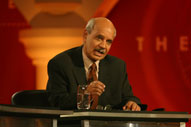
TIM SEBASTIAN
Asad Durrani could I ask you please to speak for the motion.
ASAD DURRANI
Yes certainly. I think it is a very legitimate question to start with: What is Al Qaeda? And I do not believe we know enough about it. So, let me make an assumption. It is an organisation which has worldwide presence; it can reach out and carry out spectacular acts around the globe; it has an ideology and some people believe in that, believe in that to the extent that they are prepared to make the ultimate sacrifice, blow themselves up. And whatever we may have done so far up to now, it seems that we are not making much headway. Ladies and gentlemen, I am not surprised at all that we have not. Because all the means that we have used up to now they have been inappropriate, woefully inadequate, some of them counterproductive. Military - you have already heard the collateral damage and so on and so forth. Then we say the Intelligence Agency should do something about it and I can tell you from a certain perspective that the Intelligence may be able to find out something about Al Qaeda as far as the macro picture is concerned, but it will not provide you actual intelligence to carry out against them. Where is Osama Bin Laden? That is the question that we keep asking and we don't find an answer about that. Then there are people who like to say "well, let's address the root causes". Good idea, except that are we going to agree on what the root causes are if they are so far back in history? Can we role back the entire history of the last 50 years, 200 years, 500 years? And even if we were to agree that these are the causes of certain grievances that people have against their governments right now, you can't go around toppling regimes, bombing them, whoever have created such monsters. And lastly some people believe that you can actually isolate them from their funding resources, material resources. I can tell you that these people are more innovative - the new phenomenon of globalisation - the non-state actor has usually used it to better advantage. The States have their problem because of the reason that we know. So this is why I suppose, initially you heard, we always talked to them regardless of how we describe them - they are extremist, fundamentalists, terrorists, they have an agenda. Ultimately we stop calling name and we talk to them, Northern Ireland, Palestine, Kashmir, Sri Lanka. And now lately we are in dialogue with the Taliban. The timing is one of the very important things. When do you talk to them? Of course you cannot talk to any of such organisation that carries out one explosion in the market place and you say: "come and sit with us". And you talk to them. Only once that you are quite convinced that this is a genuine, in the sense that it has a following, it has a cause, it appeals with other people, that is when you start talking to them. But even then, are they on the ascent? Are they getting better during the last 5 - 6 years? If they are then hurry up, talk to them before they get too strong and start dictating even worse crimes. But even if they are under decline as some people claim that we've got them on the run, so many of them have been destroyed - even then, my suggestion ladies and gentlemen, would be talk to them before they get desperate. In any case, the old wisdom says do not humiliate your opponent before he comes on the negotiating table. Face him as is required on both sides. I just wanted to make two quick points. There is a model argument I like to say we are the ones who created such organisations. We did something wrong - inadequacies or inefficiencies created them. And lastly, and don't tell anyone outside this hall, we are already talking to them.
TIM SEBASTIAN
General Durrani, thank you very much. If you are talking to them it shows how singularly, how unsuccessful you've been about changing their minds about anything doesn't it?
ASAD DURRANI
We are preparing the ground, we are preparing the ground, so ultimately ...
TIM SEBASTIAN
Well American National Intelligence, American National Intelligence estimate, which is barely two months old, says that Al Qaeda has regenerated key elements of its homeland attack capability. If you are talking to them, as I say, it is not having much good, is it?
ASAD DURRANI
Until the talks become more substantial, where we do recognise that they have to be talked to, and talked to at the level where this decision could be taken, until that time those secret channels can only prepare the environment, find out how the negotiation will go, make a little sense of what these people will ultimately settle down for.
TIM SEBASTIAN
You talked to the Taliban. You have been talking to the Taliban for years...
ASAD DURRANI
Certainly...
TIM SEBASTIAN
The Taliban are now attacking in greater strength than they had in any time since the American invasion. Again, that is not having much effect, is it?
ASAD DURRANI
Yes, but the military actions against the Taliban actually are the ones that are creating the effect in which their sympathy is increasing, there are of capable of renouncing. The more and more people, so more...
TIM SEBASTIAN
But the talks, the talks are failing. The talks failed with the Taliban, the talks are failing with Al Qaeda. You are getting no results apart from making both organisations stronger.
ASAD DURRANI
If these talks only could succeed we would never have an OSLO.
TIM SEBASTIAN
Who? Who do you talk to? Who...
ASAD DURRANI
Now that is something...
TIM SEBASTIAN
Who do you talk to?
ASAD DURRANI
You don't go in the first place to start talking to Osama Bin Laden. You talk to the right type of people who will ensure that once the decision is taken then we will have the right....
TIM SEBASTIAN
The people in the North West Frontier Province who you know perfectly well, the Taliban leaders, the Al Qaeda leaders you know where they are? You know where to find them?
ASAD DURRANI
And that is why - every few weeks, every few months that is why we make peace arrangement. There are such agreements that are done. Usually the violation is from the State...
TIM SEBASTIAN
But they are always broken. This is not exactly a re-endorsement for talks. General Durrani, thank you very much indeed.
Adam Holloway
Speaking against the motion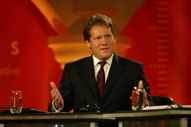
TIM SEBASTIAN
Now could I ask Adam Holloway please to speak against the motion?
ADAM HOLLOWAY
Now, ladies and gentlemen, I am against the motion because I believe that Al Qaeda has no achievable goals, they develop their own version of Islam and they have a totally destructive agenda that even when all the other grievances in the regions are sorted out will still be there. Now I am a former British soldier and it was a big thing in Britain for governments to negotiate with the IRA, or murderers of the IRA. But you know what? It brought peace, thank God. But these guys were rational actors. And there was the scope for compromise on both sides. In South Africa the White Government negotiated with the ANC because they had something to talk about. There is a huge amount for the Israelis and the Palestinians also to talk about. But these were all groups that had rational leaders with achievable goals who were prepared to compromise and they were often from the elected main stream. But how do you negotiate with Al Qaeda? I mean, what do you talk to them about? You don't exactly sit down in a conference room with lots of bottles of Evian water, do you? I mean, what is the agenda? Are you going to talk about this place and decide whether or not the city of Doha is going to be a liberal or not so liberal caliphate? I mean, how does it work? And you know we mustn't forget that it is not just about Western debt it is actually about thousands of Iraqis. It is about hundred miles down the road in Saudi Arabia, it is about what happened in Pakistan yesterday. But sadly for many people Al Qaeda has become a sort of flag, a symbol for lots of other grievances that are out there. Well, of course we need to resolve these grievances and we've got to do, particularly ones like Palestine, but we've got to do it so that we leave these psychotic murderers, extremists as rebels without a cause anymore. And I really think we make a huge mistake if we build up the importance of Al Qaeda and their fascism by giving them any sort credibility by talking to them. We need to sort out the problems. So I think the challenge for all of us now is actually to listen and engage with the thousands of established voices across the Muslim world to deal with problems like the security of Israel, Palestine, Kashmir and so on. We need to alleviate poverty. We need to educate the poor. We need to explain to people in places like this what it would mean to live under Al Qaeda. And as the British did with the IRA, you know, we may need to speak to elected people such as Hamas. But what we cannot do under any circumstances is to negotiate with mass murderers who represent nobody but themselves.
TIM SEBASTIAN
Adam Holloway, thank you very much indeed. How do you know you wouldn't be dealing with anyone rational until you sit down and tried to talk to them?
ADAM HOLLOWAY
I don't know...
TIM SEBASTIAN
They often talk. October the 14th 2002, Bin Laden said on the Internet "we call on you, the American people, to deal with us and interact with us on the basis of mutual interest and benefits".
ADAM HOLLOWAY
Well mutual benefits, I mean, you know, these are people...wait, wait, wait...
TIM SEBASTIAN
This is far more rational than we were getting from the IRA for a long time.
ADAM HOLLOWAY
Well, no, there is a big difference because the IRA actually represented somebody. Before we even negotiated with the IRA, their leadership were elected members of British Parliament although they would never sit there because they wouldn't give allegiance to the Queen. This is a completely different thing of a totally different order. These guys...
TIM SEBASTIAN
So you only sit down with elected people?
ADAM HOLLOWAY
No, well no, not necessarily. No, not necessarily. But, I mean I think, I think...
TIM SEBASTIAN
You only sit down with people you like?
ADAM HOLLOWAY
Well, I try to sit down anyway only with people I like, yes, yes.
TIM SEBASTIAN
It is not very productive though, is it?
ADAM HOLLOWAY
Well, sometimes it can be for me. But we cannot give these guys the credibility. I mean, look, we have got lots of problems across the world and in particular in the Middle East. And what happens is we created this sort of icon of Al Qaeda, as you know - the people - if you are against the West you are in favour of Al Qaeda. Well, that is quite wrong. There are lots of people who for very long time have been trying to deal with these issues. And suddenly these maniacs come along and ...
TIM SEBASTIAN
You say maniacs, but they have effectively killed thousands of people.
ADAM HOLLOWAY
Wait, wait, wait. Suddenly these guys come along and they are supposed to be the only game in town. You know, they're not.
TIM SEBASTIAN
Nobody said they were, but they are killing effectively thousands of people and they will go on doing it.
ADAM HOLLOWAY
They, they will....
TIM SEBASTIAN
What they have promised to do they have delivered on, haven't they?
ADAM HOLLOWAY
They will, they will...
TIM SEBASTIAN
So, rational to that extent?
ADAM HOLLOWAY
They will go on doing it because what happens is the more we build them up the more people want to attach themselves to them. And what we actually have to do is we have to take away the grievances that at the moment Al Qaeda is exploiting these young men over, and actually take away the support of Al Qaeda by basically giving them nowhere to go. And then actually we will see it will be another thing. It will - be...
TIM SEBASTIAN
And, in the mean time, in the mean time fight a war that you can't win?
ADAM HOLLOWAY
Oh no, no, no. We can absolutely win this war.
TIM SEBASTIAN
But you are not winning it now?
ADAM HOLLOWAY
No, we suffer from, to my view, a disastrous US foreign policy. What we actually have got to do now is to sit down and say right, the invasion in Iraq was quite unnecessary. It was appallingly handled. We've had soldiers from Britain and America really doing their best but actually with a plan that was always unachievable...
TIM SEBASTIAN
Adam Holloway, thank you very much indeed. I am going throw it open to the floor. I know there are a lot of questions out there. Gentleman in the fourth row up there.
Audience questions
TIM SEBASTIAN
I am going throw it open to the floor. I know there are a lot of questions out there. Gentleman in the fourth row up there..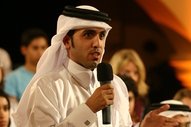 AUDIENCE (M)
AUDIENCE (M)
This is a question to Terry Waite. Look, I think it is lovely to talk about finding a common ground with people, it is a very touchy feely, it is very nice. Sadly, as Adam Holloway says, you are not living in a world where you can sit down with people and discuss. Now, we heard about the IRA and in Northern Ireland we have had paramilitaries from both sides...
TIM SEBASTIAN
Could you come to a question reasonably quickly?
AUDIENCE (M)
Ok, I am sorry. All right, so basically terrorism is an industry. We have got a higher level - you've got people, soldiers on the ground. When you consider it, like drug dealers they will morph for themselves into any profitable business, how do you know you are ever going to satisfy them? So in other words, why do you think they are ever going to sit down and talk to you and be satisfied with what compromise you are coming to?
TIM SEBASTIAN
Terry Waite.
TERRY WAITE
Well, let me just put this into a broader context. We are seeing within the Islamic world a broader insurgency movement and that is a desire within Muslim society for a greater sense of Muslim identity or autonomy, freedom from Western imposition and to develop society on Islamic terms free from some of the Western secular concepts. Now those are particular aims to which I could subscribe, I think that is quite laudable to actually move in that direction. Al Qaeda are in fact taking the extreme position and saying we will achieve unity in the Islamic world and we will achieve victory by fighting, by battle. And terrorist movements attract to themselves, I think our speaker here does them an injustice when he says there are not rational people there, there are. But terrorist movements also attract to themselves people who are psychopathic by disposition. Now if you wish to, in fact, begin to resolve this problem, you have to seek an entry and you seek an entry by establishing a firmer dialogue, a relationship with the Islamic world to begin with...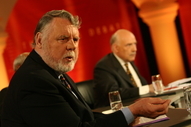 TIM SEBASTIAN
TIM SEBASTIAN
All right, let me bring in Laith Kubba in here.
LAITH KUBBA
Allow me to say I fully understand and sympathise with the return to Islam and I think this is very real, very rooted in Muslim countries but I fundamentally differentiate this from what Al Qaeda is doing. What Al Qaeda is doing has, it has become in a way an industry very effective in its delivery. But it festers on issues religious and ideological, it does not, it does not relate to Islam and the return of the Islam, not...
TERRY WAITE
But you see, if I may say so, the West with its tactics has built up Al Qaeda. Guantanamo Bay, extraordinary renditions, we have actually fuelled Al Qaeda...
LAITH KUBBA
Absolutely, it's, it's...
TIM SEBASTIAN
Well, they have post-dated the Al Qaeda, didn't they? Al Qaeda has been around long before Guantanamo Bay, and Abu Ghraib. We, at least in the West ...
TERRY WAITE
Well, yes, but they fuelled it. Adding those factors - Guantanamo Bay and extraordinary rendition and all that has gone with it - have actually brought in new recruits to Al Qaeda.
TIM SEBASTIAN
A very brief comment Laith Kubba and then we are going to move on.
LAITH KUBBA
I cannot agree more that we need to handle conditions that led to their growth. I cannot agree more we need to expose their ideologies and theology, but fundamentally they are an effective death machine with many means...
TIM SEBASTIAN
All right, Laith Kubba, you've made that point. Lady in the third row, yes you. AUDIENCE (F)
AUDIENCE (F)
I have a question. If you think talking to them would resolve this, what do you think we can talk to them about? And if talking to them would fix it, then you think we shouldn't punish them for the thousand people they have killed?
TIM SEBASTIAN
General Durrani.
ASAD DURRANI
Then we will actually have to go on and see who has killed more people and how are we going to punish them. My friend Terry Waite has already said you bomb people from the air and you kill very many more people. Now that is the wrong way to start a dialogue. Once we initiate something, instead of prejudging what is it that we can talk about and is there a common ground? People do start from extreme positions and as you go on, sometimes people with the extremist positions that are isolated, at times you may find that incrementally you have covered certain grounds where some of them will come, gravitate towards you and will be prepared to compromise...
TIM SEBASTIAN
Adam Holloway, come in here...
ADAM HOLLOWAY
As I see it there are two types of terrorists in the world today. There's the apocalyptic one who kind of defines himself by some sort of religious thing. And then you have those who are doing things for political aims. And what I mean by saying that these guys aren't rational actors is that you can't sit down with them and say "well our position is such and such and yours is such and such" and we have a bit of a compromise. I mean how can you have compromise with people who would like to wipe out the whole way you conduct yourself, for example, in this society? It is not possible, these are not rational actors.
TIM SEBASTIAN
Let me just go back to the questioner. Your question about would you punish those who have committed those acts? What is your position on that? Would you stand up and tell us what you feel about that?
AUDIENCE (F)
I think they should be punished because it is like they are murderers. You don't just walk up to a murderer and tell them: "oh yes, you killed someone" and then you discuss it with them. You send them to prison and they get punished for the bad things they did and that's how it should be. They shouldn't just be talked to because they are not rational, they are not thinking people and they don't deserve being talked to.
ASAD DURRANI
They are not the ones who initiated the whole thing. I have said it is the State usually. Al Qaeda came into being because of a certain reason.
TIM SEBASTIAN
She is talking about people who carried out the acts.
ASAD DURRANI
Yes...
TIM SEBASTIAN
You are not talking about those who initiate them, are you?
ASAD DURRANI
No, I am talking about who started, how direction takes place, who are the people who are killing, otherwise will have a problem talking to even some of the regimes who go around killing more people than the terrorists ever had.
TIM SEBASTIAN
All right, let's move on to the gentleman in the second row. Your question, please sir.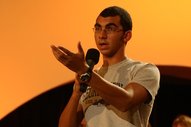 AUDIENCE (M)
AUDIENCE (M)
My question is for the gentlemen against the motion. In any problematic matter there is always a cause and effect and after the many failed attempts of eliminating Al Qaeda it is clear that we try to eliminate the effect, not the cure. What other means do you propose, besides having direct talks with Al Qaeda that will ensure a permanent solution, not just a temporary one?
TIM SEBASTIAN
Laith Kubba.
LAITH KUBBA
I would suggest three. Number one, immunising the Muslim public by exposing the real nature of Al Qaeda, both its twisted theology, its unrealistic simplistic ideology. We need to expose them. Number two, certainly addressing the conditions that have led to their growth, whatever the issues are and there are very long lists of issues, tough ones facing Muslim countries, especially the youth. But the third one, which is the most important, you need strong intelligence. It takes only six people, Al Qaeda affiliates, in a city of a million to create havoc in that city. And we need strong intelligence, every single Muslim, every single institution should take its responsibility in fighting this cancer. Otherwise we are all doomed and they will cause death and death until they are stopped.
TIM SEBASTIAN
I noticed, I noticed...
ASAD DURRANI
These are the things we have been doing for the last many years. They have not produced results. They have increased the resentment amongst the people instead of winning their hearts and minds we keep saying that we will do it this way and we are losing on that front. Coming back on the intelligence, we have already said about the limitation of intelligence, don't believe, don't expect, the deception, deliver any miracles. For the last 5 - 6 years the whole world, with all the technology at their command, are looking for that group of 30 to 40 people, we don't find them...
LAITH KUBBA
Let me give you one point. Many Muslims I've seen are either misled by their Islamic appeal because some Muslim scholars are soft enough on the issue of death and others are misled by their political arguments. I think one needs to bring hard Islamic Koranic arguments against them and very hard political arguments why they are at dead end. And they must be exposed.
TIM SEBASTIAN
Very briefly and then I want to bring the questioner in.
ADAM HOLLOWAY
But General, surely the reason why the intelligence stuff hasn't worked historically is because actually we left some of these huge questions not dealt with, these huge problems not dealt with. Now we face a gigantic threat where it is only limited by the equipment that these guys can get hold of. Surely now we have to have a huge international focus for sorting out places in your backyard such as Kashmir. In sorting out the security of Israel and justice for the Palestinians in doing something to make something out of the mess that is Iraq. We've got to do these things...
TIM SEBASTIAN
So change the kind of policies that Al Qaeda is asking you to change?
ADAM HOLLOWAY
Well, it is not just Al Qaeda who is asking for them, it's...
TIM SEBASTIAN
No, but, they are.
ADAM HOLLOWAY
Sure, so is the bloke in the car park sitting in his car. I mean the problem is that Al Qaeda has sort of, among some people in the Muslim world I think, become the flag waver for this and this is quite wrong because lots of people have been talking about these things for a very long time. And we need to separate all those tens of millions of good people from these lunatics.
TERRY WAITE
But going back into history...
TIM SEBASTIAN
I want to bring the questioner in here. How do you feel about that?
AUDIENCE (M)
I was just going to say, I was just going to add that even a mental patient, a mental irrational patient sits down with a psychiatrist and speaks. And the psychiatrist listens. It is always a dialogue.
TIM SEBASTIAN
All right, we are going to move on to the lady in the front row.
AUDIENCE (F)
My question is for the panel for the motion. You have talked about finding a common ground, finding an entrance and finding a solution through the situation but it seems to me that you have forgotten the most important element in this situation, which is the victims and their families. Do you think that those people are willing to negotiate with Al Qaeda in a very objective manner after what they have suffered?
TERRY WAITE
I personally have not forgotten the victims. Let me just tell you an interesting story.
TIM SEBASTIAN
Briefly please.
TERRY WAITE
Very briefly. A lady, I was sitting with a lady in England, in Liverpool, whose son was beheaded and I was with her when that news came forward. And she said to me "my grief is indescribable. Nothing could explain how I feel as a mother at this time". But then she went on to say something very important, she said "my grief is no different than the grief of a mother in Iraq who has just lost her children as a result of bombing, as a result of the invasion". Now that was a remarkably compassionate thing to say at that present time. So, there maybe people who have not forgotten the grief, what we need to do is put an end to the grief and the West has to build up a more effective relationship with the Islamic world because eventually it will be the Islamic world that deals with Al Qaeda and reduces it, divorces it from its base of support. But the moment, when the West is hurling insults at people and saying "hah, you are part of the axis of evil or all that goes with that", for goodness' sake, that is a gross insult. And anybody who makes such statements ought to be ashamed of themselves.
AUDIENCE (F)
But sir this is not some sort of a Holy War between the West and East. It is something that is in the Middle East and we need to find a solution for it. I do admit that there is a lack of communication, but I think that at this point they are not willing to accept our point of views. And I think that the rest of the Arab world could find it a bit hard to go by their conditions.
ASAD DURRANI
Young lady that is true. Initially it always starts with local grievances. The problem is that once this thing goes on and spreads and engulfs more than one country, then it does become ultimately a multinational problem. And well, due to the evils that have taken place during the last twenty years or so. In people's perception it does become a problem West -East, Islam versus the West because also all the other grievances also come to the fore, Palestine not resolved, Kashmir not resolved. And now we want to say resolve these problems, which could not be resolved for 30 - 40 years. But the simpler way to go about it means simply the more practical way of doing it is, open up channel with them in the mean time no one is saying that the other problems should not be resolved. About the victims, initially yes the reaction of the victims, families is, good Lord, the terrorists.
TIM SEBASTIAN
Adam Holloway.
ASAD DURRANI
But it goes on. But it is the State that is blamed ...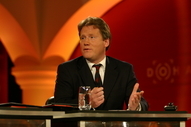 ADAM HOLLOWAY
ADAM HOLLOWAY
But General, she is right. In the first instance, is the society in your country, society in countries like this that is most threatened by these people in terms of changes to them, and if not, in large terrorist attacks.
ASAD DURRANI
That is why we are more concerned and that is why we want to find a practical solution and not something more or something sublime ...
TIM SEBASTIAN
All right.
ASAD DURRANI
In which we say we are going to resolve the world problems first and then do something about it...
TIM SEBASTIAN
All right we are going to take questions from the gentleman in the second row.
AUDIENCE (M)
This question is for the motion. Why should we talk to an organisation that actually doesn't want to talk with us to begin with? I mean even if we sated to their demands and yield to them, if you will, don't you think that they actually will demand even more? They are driven by a medieval ideology. Ok, go and look at their websites, look at their videos they are always issuing. I mean, seriously, how can we talk to them? How can we negotiate and talk with them as rational people if they aren't being rational to begin with?
TIM SEBASTIAN
Terry Waite.
TERRY WAITE
Well you are raising a question of tactics, I think. And the way in which, in my view, this has to be approached, but it is a good question you raised, but the way it has to be approached, is first of all and I repeat what I've said, namely that trust and confidence between the West and the Islamic world has to be built up. And at the moment there is not that thrust and confidence there. The Islamic world has its own problems and its own aspirations. But some of the ways in which the West has behaved, and I am not putting all the blame on the West. Frankly, have not helped that trust building...
TIM SEBASTIAN
But Terry Waite, he is asking you how you find a common language with people who kill...
TERRY WAITE
Yes, what I am saying...
TIM SEBASTIAN
How do you find a common language with the people who kill? That is what you are asking, isn't it?
AUDIENCE (M)
Yes, exactly.
TERRY WAITE
Well, that is exactly the problem...
TIM SEBASTIAN
Not how you deal with the wider Muslim world....
TERRY WAITE
That is exactly the problem that faced the people in Northern Ireland. That is exactly the problem. And the way you do it is gradually you work towards the people who have key positions of responsibility, who have influence and you sit down and you listen. And you enter the dialogue and you enter into a pain staking process, which is a long process. It is very difficult, it is very hard. But experience shows, from all the examples that we have been given, it is not impossible. Because...
TIM SEBASTIAN
Questioner, are you convinced by that?
AUDIENCE (M)
Not really, because, you know, the IRA, the Basque militias for example, they had clear political demands. Al Qaeda doesn't have exactly have any clear political demands. What they are demanding for example is getting rid of the West, fighting the crusade of the West...
TERRY WAITE
Yes, messianic demands. It has made demands, in the sense that, as you have clearly described it, but also we are stereotyping again and what you have to do in dialogue is get behind those stereotypes, we are making assumptions. You have to get behind these assumptions...
TIM SEBASTIAN
All right, Laith Kubba you want to come in?
LAITH KUBBA
Can I just make a comment? Even the most brutal dictator you can think of on earth, whether it is Saddam Hussein or whether it is Stalin, when they kill they had a purpose. And you can, irrespective of how cruel they can be, but you can see a purpose. Nobody I have seen so much at ease at killing indiscriminately innocent people with no discomfort at all. They have no purpose...
ASAD DURRANI
Are you trying to justify the purpose that they had, these people do it as reaction, because there is nothing else they do, can do. The others, the state head had other options ...
LAITH KUBBA
I do not believe that. I think they use all these issues to camouflage their operation. Because they have mastered ways of recruiting people, twisting their minds. They are very good in technology, they are most dangerous because they are effective and I think the fact that they lack total morality and they have no purpose makes them most dangerous.
TIM SEBASTIAN
All right...
ADAM HOLLOWAY
I am staggered General. I am staggered that you can say that they have no other options. I mean daily Sunnites and Shias have been blown apart by Al Qaeda in Iraq, terrorists attacks in Pakistan, the stuff in Madrid on innocent commuters, I mean...
ASAD DURRANI
They are driven to desperation. They always, their first reaction is they want, Al Qaeda wanted to reach out to the Saudi government and say "there are other options" instead of, you know, doing this thing in the air - in the Gulf War. They are the ones who actually make a rational point to start with, no one listen to them. You are talking about rational young men. What is the rationality behind invading Iraq?
TIM SEBASTIAN
That takes us in another direction. We are going to a question in the front row please.
AUDIENCE (M)
One of the arguments that President Bush actually used to justify the war on Iraq was that Saddam was an ally of Al Qaeda, even though their ideologies were completely different. So don't you think that if there were constructive talks between the US and Al Qaeda that could have avoided the crisis in Iraq today?
ADAM HOLLOWAY
I was also there for the Second Gulf War and I think that the American administration was looking for a reason to do it. In fact, it could have all worked out all beautifully and the Iraqi people got a multi-billion dollar gift and got rid of Saddam Hussein and moved on nicely. But the thing since then, as we all know, has been a bit of a disaster. But I don't think that the Americans have been more likely to establish whether Al Qaeda were involved or not, had they been talking and I think, they probably - they knew perfectly well that they weren't.
TIM SEBASTIAN
All right...
ADAM HOLLOWAY
Tony Blair certainly did. So did Gordon Brown.
TIM SEBASTIAN
Thank you. We will go to the gentleman on the end row there, who had your hand up.
AUDIENCE (M)
Good evening, my question is to Mr. Laith Kubba. Why do you consider Al Qaeda as an illusion and the United States itself categorised Al Qaeda and invaded Afghanistan to get rid of Al Qaeda. And after invading Afghanistan Al Qaeda moved outside from Afghanistan and took it from Iraq as a landmark. So the United States invaded Iraq to fight, to get rid of Saddam Hussein and now Iraq becomes a landmark for fighting against Al Qaeda. And, if this is the case why don't you suggest to open the dialogue with Al Qaeda and stop the bloodstream in Iraq?
TIM SEBASTIAN
Are you from Iraq?
AUDIENCE (M)
Yes, I am from Iraq.
LAITH KUBBA
Well, two quick points. Number one, I did not say that Al Qaeda is an illusion. I said talking to Al Qaeda is an illusion. I think Al Qaeda is real. I think even the US, despite the arguments that it made about Al Qaeda I think, has not clearly seen Al Qaeda for what it is. The US has its own agenda and Al Qaeda was part of its agenda. But, I do believe...
AUDIENCE (M)
But we are part of their agenda.
LAITH KUBBA
Absolutely, but the debate about US and its policy in the region is one thing. The critique, the mistakes...
AUDIENCE (M)
But, sorry, but also Al Qaeda has an effect on the policy of the region.
LAITH KUBBA
Absolutely. I am looking at it purely from a Muslim and an Arab perspective to say this is a disease that is spreading in our own body that it is going to bring even ten times more mayhem than we have seen so far. We must take responsibility. I think the fact that we are asleep, we toy with it, we think that it is like any other organisation. It is going to expose us to far more dangers than we have seen so far.
TIM SEBASTIAN
You would talk to Al Qaeda?
AUDIENCE (M)
To stop the bloodstream? Yes.
TIM SEBASTIAN
Because of personal experience?
AUDIENCE (M)
It is not because of personal experience, but I have friends, I have family there, I am worried about them every single day. Why would I not talk to Al Qaeda and stop the bloodstream there? Why not open the dialogue? We didn't try this. Only we tried the fight, only we tried the war and it didn't work out.
LAITH KUBBA
But that is a legitimate desire, but that is an illusion. I understand your feeling...
TIM SEBASTIAN
You don't know it until you try it, do you Laith Kubba?
LAITH KUBBA
I tthink it has been tried in Iraq. In fact, today there is bloodshed between the insurgency and Al Qaeda because they've realised that they are absolutely out of control.
TERRY WAITE
Yes, but these arguments, if I may say so, these arguments for not talking to people who are defined as terrorists are exactly the same arguments that we used a number of years ago about the IRA, for example. Exactly the same arguments. You can almost hear them being repeated. You can't sit down and talk to people who are blowing up innocent civilians. They are beyond the pale. And the answer is they were not beyond the pale...
LAITH KUBBA
I have not used the word terrorists. In fact, I am saying clearly, with all other groups that use violence I believe in dialogue. But this group has absolutely, there is no scope in the horizon, in their rationale, in their mode of operation, in what they are prepared to do...
TERRY WAITE
Exactly the argument that has been used in the past, exactly the same argument. It's no different.
ASAD DURRANI
I assume that it is going to be an illusion. Try it out...
LAITH KUBBA
I think go and read carefully their mindset and you will know exactly where they are heading, if they...
TIM SEBASTIAN
I think we have got as far as we can on that question. Gentleman in the front row.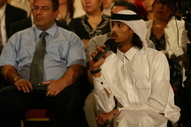 AUDIENCE (M)
AUDIENCE (M)
I would like to speak to the opposition. Since 2001 they have been having the war on terrorism and it's been very unsuccessful, what do you have to lose to talk with them? In the Koran there's a passage that says "if you save one life it is as if you save the whole of humanity".
TIM SEBASTIAN
Adam?
ADAM HOLLOWAY
I think that on the 12th September 2001 the West had the sympathy and goodwill of hundreds of millions of people in the Muslim world. I think the disastrous experience with Iraq, the Abu Ghraib, rendition and so on has done a huge amount of damage, the reputation for example of the United States which actually has been and is a great force for good in the world. I think almost an historical challenge over the next one, ten, twenty, fifty years has got to be to separate people from this very small band of extremists and that involves sorting out some of these deep underlying problems. That's what we've got to do because...
TIM SEBASTIAN
The question is what have we got to lose.....
ADAM HOLLOWAY
What have, I'll tell you exactly...
TIM SEBASTIAN
...by talking to Al Qaeda.
ADAM HOLLOWAY
Because what we don't want to do is give Al Qaeda credibility amongst those tens of millions of people as the gate keeper to peace. They are not. They are the barrier to peace. You know, the gate keeper to peace is dealing with established people, who for a long time have been dealing with issues, such as the one the General raises in Kashmir, sorting out something in Iraq, sorting out security for Israel and justice for the Palestinians...
TIM SEBASTIAN
Ok, you wanted to come back on that? Let me just hear back from the questioner. You're anxious to response to that?
AUDIENCE (M)
I believe when they bombed New York, the World Trade Centre, that gave them credibility and by us being here and talking about this issue, this gives them credibility.
ADAM HOLLOWAY
It gives them credibility as mass murders, but not people to be the spokesmen, the first port of call, the entry point for dealing with these problems, absolutely not.
TERRY WAITE
If I can just come in and say this: that you spoke about war on terrorism. Terrorism to my mind is symptomatic of much deeper disorders. If you just say, right, we're going to fight terrorism right there without getting to those deeper disorders you are going to be led astray. As the West has been - let me just finish the point. What you have to do is begin to enter into dialogue, listen to the other person, listen to the other side to begin to uncover some of those deeper disorders which are frequently political, economic, ethnic and so on. As you begin to uncover those so you begin to find the roots, which give cause to acts of violence...
TIM SEBASTIAN
There is a bit of urgency when so many people are dying, isn't there?
ASAD DURRANI
I agree. If there is a reason for urgency then we could have handled it on a number of occasions. Certainly on the 11th September and after that there was a good chance that one could have entered into some sort of a dialogue process with them, the Taliban did offer that we will extradite them to a third country, where they can be tried. But since we keep on doing in Afghanistan, Iraq, making the environment more vicious, making it more difficult for everyone else, people die and then we say now "no we can not talk to them because they have killed so many people". Now, this is a marvellous argument...
TIM SEBASTIAN
Adam Holloway.
ADAM HOLLOWAY
Sorry, there is a huge difference between what is happening in Iraq and what is happening in Afghanistan...
ASAD DURRANI
All situations are different for God's sake...
ADAM HOLLOWAY
But it is very important that you understand what we are trying to do in Afghanistan is to bring security and to bring reconstruction and alleviation from poverty. You know, this is a huge thing we are trying to do, it's now working...
TERRY WAITE
Are you sure that's what we are trying to do?
ADAM HOLLOWAY
Absolutely, I've been there quite a few times this year. We are not entirely succeeding...
LAITH KUBBA
On the issue on public sympathy with Al Qaeda. If you are talking about people in Pakistan wearing t-shirts with Bin Laden's picture on it, and you telling me you need to talk to those people, absolutely. We need to immunize them from Al Qaeda. If you look at Jordan where initially they had some sympathy with what was happening in Iraq, in terms of the car bombings. But the public opinion in Jordan overnight turned upside down when four bombs went into their hotels, into weddings, and the whole of Jordan went into mourning. And they have just had a taste, a tip of the iceberg of what Al Qaeda will do, not can do but will do in every city...
TIM SEBASTIAN
All right, okay, there's a lady in the third row there. We'd like to hear from you.
TIM SEBASTIAN
We'll take a question from the lady in the third row.
AUDIENCE (F)
Well my question was directed to the panel against the motion. First of all I would like to point something out. Al Qaeda was a result of formation of previous groups that were encouraged by both West and East to fight Communism. The West and the East encouraged Muslim groups as a method to eliminate the spread of Communism. So therefore I think it's our duty both in the East and in the West to encourage negotiation with Al Qaeda, talking to Al Qaeda. It's very important...
TIM SEBASTIAN
All right, Adam Holloway.
ADAM HOLLOWAY
Well I was in Afghanistan with the Resistance in the early 80's and I imagine Tim probably was as well and, you know...
TIM SEBASTIAN
No.
ADAM HOLLOWAY
You weren't, oh later then. We did not create Al Qaeda. What we did was we supported Resistance groups, in fact through the General's department, the ISI, Britain and America gave equipment and money and the Pakistanis channelled that to the most efficient military groups in order to fight the Russians. So we weren't creating Al Qaeda, we were trying to get the Russians out of Afghanistan in line of what the Afghan people at the time wanted quite badly.
LAITH KUBBA
If I may add, irrespective of how Al Qaeda originated and this is subject to historical, analytical analysis wherever that might be, the reality is it's the past. What we are facing today, is today. We have unleashed this Frankenstein and it's no good to say "well, this is how it happened". That Frankenstein is out there and it's spreading and causing all that death and it needs to be tackled head on.
ASAD DURRANI
You see the lady did make a very good point that we do create sometimes organisations for a particular purpose but when that purpose is over we do not want them to follow the same purpose elsewhere. Afghanistan is again under occupation and so is Iraq. My argument is that if it was right to resist similar occupation it is absolutely legitimate for so many groups to resist foreign occupation in other countries nowadays, and for the rest of us to sympathise with those people who are resisting and what we are doing in return is calling these people names. We just declare them terrorists, we prejudge what might happen and we also...
LAITH KUBBA
Pakistan is not under occupation but there are car bombs going off in Pakistan today...
ASAD DURRANI
It's because people sympathise with what happens next door and we are actually also doing a few wrong things within our territory, we also carry out these military actions sometimes under pressure, sometimes...
TIM SEBASTIAN
All right, we're going to take a question from a lady in the fifth row.
AUDIENCE (F)
My question is that if Al Qaeda members do agree to negotiate and come out of the shadow, what guarantee will they be given?
TIM SEBASTIAN
Terry Waite, what guarantee?
AUDIENCE (F)
Will they be executed like the present members of Al Qaeda?
TERRY WAITE
Well I don't think...
TIM SEBASTIAN
Are you from Pakistan, are you?
AUDIENCE (F)
True, yes.
TERRY WAITE
I didn't quite understand, could you repeat...
ASAD DURRANI
The lady wants to know that if we did reach some sort of negotiating process would we be giving them guarantees that they would not be executed? I think young lady it is going to be a very difficult and very complicated process. In which, giving, granting amnesties as to who will be executed and to who will be forgiven would come much later because those people will also have a list, a long list, in fact a longer list of those on the other side who carried out Guantanamo Bay, who carried out renditions, who carried out indiscriminate killings. So ultimately as it happens every time, whether it was Sri Lanka, where you know the terrorist probably more torn than anywhere else?
TIM SEBASTIAN
You think they should be given amnesty?
AUDIENCE (F)
Isn't this a call for death for them? If you're calling them for negotiation but right at the end they know, they do know that they will be executed for the crimes they have committed in the past. Do you think that is something that will attract them to the floor of negotiations?
ASAD DURRANI
Prejudging the outcome is a very dangerous business. You should not ask for that, as we go along we will be discussing these things - very threadbare, very complicated...
ADAM HOLLOWAY
I mean, I don't think we should be negotiating with them in that sense, I don't think we should be calling them in. But we spoke about Northern Ireland and one of the things, I think that the victims of terrorists on both sides, that the families found very, very difficult was that we were releasing the people who had committed these terrible murders and torturing and so on. But, you know, actually in that case it worked and it's created an environment for peace. Though for reasons I have already given I don't think we should be negotiating with Al Qaeda.
TIM SEBASTIAN
There was a lady in the third row. You had your hand up.
AUDIENCE (F)
My question is to the panel for the motion. You keep on saying we should talk to them, the West should talk to them. But who is the person who is going to sit with Al Qaeda and negotiate? Is it the governments of the Western countries? Is it the populations? Who's going to?
ASAD DURRANI
Well that's one very interesting point that gets made. With whom are we going to talk to and who on this side, sometimes I believe is going to be a little more problematic? For example, from the side of the State, whom are we going to trust with that person or body to take the dialogue process forward? We are talking about, are these people rational? On our side...
TIM SEBASTIAN
What is the answer?
ASAD DURRANI
Who are we going to now select as a rational person? I believe if we, hypothetically, if Osama Bin Laden and Bush were to sit together. I think Osama Bin Laden will have a bigger problem.
TIM SEBASTIAN
Would you like a more serious response?
AUDIENCE (F)
Yes please.
TERRY WAITE
I think it is a question of tactics. It's a question of beginning to open up many channels, beginning to open up the process of dialogue. You see if I were to, if I were to set out a few steps for dialogue. First of all you open the channels. Secondly, you, if possible, engage in face-to-face discussion with people whose views may radically differ than your own. Thirdly, you try and get to the root issues - what is that is motivating them? What are the root issues? Not just the assumptions that are made but the root issues about that. And you move on in that process to trying to find a resolution to the problem.
TIM SEBASTIAN
All right, does that satisfy you?
TERRY WAITE
Now, that is not impossible to do. It has been done many times. As for the question about punishment, well you can't answer that yet. I mean if you look at South Africa, I mean, a remarkably courageous step was taken by the whole population with the Peace and Reconciliation Commission. Who would have thought that it would have turned out like that?
TIM SEBASTIAN
All right, Terry Waite, can we just see whether it that satisfies the questioner.
AUDIENCE (F)
No, it doesn't answer my question because you keep on talking about sitting down and talking to Al Qaeda. But if you don't know who is going to sit down with them and speak to them. How can you...
TERRY WAITE
Well, you see my point is this. But sometimes in this process of dialogue it will not necessarily be a Westerner who sits down and talks with Al Qaeda. The Westerner will have to build up sufficient relationships and confidence with the Islamic world, so that many who people who are in positions of influence in the Islamic world could begin to enter into that dialogue.
AUDIENCE (F)
So you are saying that...
TERRY WAITE
But at the moment I am saying that confidence does not exist generally because the West has in fact used smaller groups in fighting proxy wars as we have just been discussing. And also it is perceived as trying to impose a particular system of democracy on countries, which is a Western system.
TIM SEBASTIAN
All right...
TERRY WAITE
.... May or may not be right...
TIM SEBASTIAN
We are going to the question in the third row...
TERRY WAITE
This is how it is perceived...
TIM SEBASTIAN
Question in the third row.
AUDIENCE (M)
This question is for Mr. Durrani. Don't you think that talking to Al Qaeda and recognising them will show some signs of weakness within the Occidental camp and therefore open doors for other terrorist organisations?
ASAD DURRANI
You see this is a point that one wanted to make in the presentation that you do not want to talk to anyone. And you also do not want to talk to the other side when you think that you are going to speak from a position of weakness. And if our assessment is that we are getting weaker and they are getting on the march, and there are good indications that their sympathy is increasing, their ability to carry out, perpetrate certain actions is increasing, that means they must be gaining in strength. So before they get too strong, in that sense, in the people's perceptions, where they are not willing even to accommodate those things that my friends here are worried about, then we have a problem. This lady wants to know with whom do we talk. Trust any good intelligence agency that they have the right type of contact that they can make a few things happen. It is not only because our various steps are then released through a certain organisation, but also so many hostages that were taken. If some good people in contact got them released, so you can be quite sure that there are credible sources available to bring about the negotiation at the right time at the right place...
TIM SEBASTIAN
After the WMD fiasco in Iraq could you recommend any good intelligence agencies?
ASAD DURRANI
Try the ISI.
TIM SEBASTIAN
Thank you. Gentleman at the back.
AUDIENCE (M)
My question is to Mr. Holloway. You have just said that you have been to Afghanistan and hopefully you have experienced how people are suffering there. So what do you think, how long should it continue, how long should we wait for Al Qaeda to get destroyed completely. How long, two years, ten years, twenty years?
TIM SEBASTIAN
You're from Afghanistan?
AUDIENCE (M)
Yes, I am from Afghanistan.
ADAM HOLLOWAY
Well Afghanistan is a big question, I mean, the truth is in the North and the West things are going extremely well. A large amount of development is happening and there is security and so on. But it is a very, very different picture down in the South. I mean, it is always doubtful, history teaches us, that Afghanistan is a very hard nut to crack and who knows whether we will do it. But the fact is that we are in Afghanistan to try to provide security and to try and provide reconstruction to bring some source of development, health care and so on to people, after centuries of none of it and decades of war. Whether it will work or not I don't know but the picture is very good in the North and the West.
ASAD DURRANI
That is the official position of the British Government?
ADAM HOLLOWAY
Sir, I am an opposition MP and it is an objective truth that the situation is good in the North and the West. I quite agree it is pretty appalling down in the South.
TIM SEBASTIAN
Are you convinced by that?
AUDIENCE (M)
No, he didn't answer my question and I would also add that there is no North and South issue in Afghanistan currently. It has already been solved, I guess. And hopefully it is solved. My question is when is it going to end? How long should the people wait? How long should we see people dying and starving? How long?
ADAM HOLLOWAY
There is actually a North and a South issue, because you have different tribal groups as you well know....
TIM SEBASTIAN
Could you just address the question - for how long are people suppose to go on dying for without you talking?
ADAM HOLLOWAY
Without me talking? Look what, what we have...
ASAD DURRANI
Could I answer on your behalf?
ADAM HOLLOWAY
Yes do, I may correct you.
ASAD DURRANI
Yes, if we have to talk about the, I mean, the young man is absolutely right, the North and the West are also not in a terribly good state. But if we have to keep on talking about South and the East, even those people who are on the side of the United States and the allied forces, some of their NATO partners, they are begging the United States to give up their particular track and start doing more development and less fighting. Within that area the British troops, for example, the other day, a few months ago, had an agreement with the locals and that saw peace in that area for about six months. Generally we train in Afghanistan, also from the government of Karzai side is, we have to now, not only talk to the Taliban but induct them, bring them closer together, so that is the negotiation track we want to go.
TIM SEBASTIAN
You are not getting much of an answer to your question, are you?
AUDIENCE (M)
No.
TIM SEBASTIAN
... From anybody, which is perhaps revealing in itself that nobody wants to say how long the killing has got to go on for, before they will actually sit down and have a meaningful discussion.
ADAM HOLLOWAY
Well, it is quite a hard thing to answer. I mean, I have actually to agree with the General. I have been saying it in the UK quite a lot recently that actually we have got to rebalance this and turn the emphasis around into reconstruction, less of a military issue. I mean, yes I think actually occasionally there is a similarity, some people who we will brand Taliban are actually local tribal elders...
TIM SEBASTIAN
Let him answer his own question.
AUDIENCE (M)
I will just say that by asking this question I didn't mean that I am supporting the motion that we should talk to Al Qaeda or negotiate with Al Qaeda. What I mean with the question is that we need an end. We are tired of whatever is happening currently in our country and I am hopeful in Iraq and hopefully in other countries currently suffering. So we need an end and we want peace, whatever it takes. We are not supporting Al Qaeda. Afghanistan is not supporting Al Qaeda. I as an Afghan don't support Al Qaeda. And I think nobody supports Al Qaeda.
TIM SEBASTIAN
I think we are going to move on, take the gentleman up there.
AUDIENCE (M)
Yes, my question is for Mr. Terry, please. Can you negotiate with the Pope and try to talk him out of being Catholic?
TERRY WAITE
Talking him out of being?
AUDIENCE (M)
Catholic.
TERRY WAITE
Can we talk to the Pope and talk him out of being Catholic?
AUDIENCE (M)
Yes, you are a negotiator right?
TERRY WAITE
No, I think this is unlikely.
AUDIENCE (M)
Yes, because he is a man of concepts. He has concepts carved inside his heart, soul and mind deeply. That is why I think you cannot talk to Al Qaeda because they are, I rather agree with Mr. Adam, they are rational, they are not crazy people. Crazy people are easy, psychiatrists would do it. So can you talk to a man with reason who believes in this thing that he would die for it?
TERRY WAITE
Well, you see we are talking now about a question of tactics, how do you approach this? Al Qaeda has an extreme view and they use extreme violence to pursue that view. Now the question is how do you begin? And my argument is that you begin by building the confidence with the Islamic world and the Islamic world will begin, if it has that confidence of the West, it will begin to isolate Al Qaeda itself because Al Qaeda is as big a nuisance to the Islamic World as it is to the West. And the majority of the Islamic World does not subscribe to the way in which Al Qaeda practises its particular philosophy. But until there is that confidence, until there is that dialogue, it is going to be exceptionally difficult to even begin the dialogue, to clear away the assumptions and to get what we need to get to on some of the underlying issues that cause this problem. I go back to what I said - terrorism is a symptom, it is not in fact the root issue.
TIM SEBASTIAN
The lady in the first row there.
AUDIENCE (F)
My question is to Mr. Laith Kubba. You said that Al Qaeda is a death machine and it hurts to see other people dying, but what hurts the most as a Muslim, is that it's representing Islam. And my question is as a Muslim don't you believe it's our duty to talk to them because it's our religion and they probably, I don't know if they are misguided or, but forget politically, but as a Muslim shouldn't we talk to them and get a clarification?
LAITH KUBBA
If I can answer this directly. The answer is, you talk to everybody who expresses sympathy with them, you talk to everybody who might be influenced by them, you talk to everybody who wants to talk about what they are doing. But just conceptually differentiate between the individual who gets twisted ideas about religion or misguided and between an organisation that has a structure, sources a funding, ways of operation, intelligence gathering, recruiting, operating and the whole machine, this whole organisation has one goal - create mayhem, bomb with no limitation. With this, with the organisation, as an organisation there is nothing to talk about. But with souls, of course every soul there is a way to reach to that soul and to show the light to but we are not talking about individuals, we are not talking even about Bin Laden as a person and his religious background. We are talking about an organisation whose mission is to spread death and that is the reason there is nothing to talk about.
TIM SEBASTIAN
Are you convinced by that?
AUDIENCE (F)
I don't think it's an organisation because we're part of it whether we like it or not. When I say I am a Muslim, I do get second thoughts (from others) - "oh, is she a terrorist?" So I am part of it whether I like it or not and I don't think it's an organisation where we can step aside and say "oh we can't talk to Bin Laden". But we should talk to the high people in charge of this and because we're really, really part of it, as I say so...
TIM SEBASTIAN
All right...
LAITH KUBBA
One last remark. As I say it is very unfortunate that the way the media and the West or politicians have used the word Islam and Islamist and terrorist in such an easy way that makes a lot of people feel they are pushed on the other side. But that's a fundamental sin...
Vote result
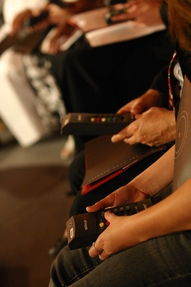 TIM SEBASTIAN
TIM SEBASTIAN
Well ladies and gentleman we have come to the point of the proceedings where we are going to vote on the motion that: This House believes it is time to talk to Al Qaeda. Would you please take your voting machines? If you want to vote for the motion you press button one, the yellow one. If you want to vote against the motion, then you press button two, the red button. Would you just do that now? You only need to press the button once. And then with the wonders of modern science your vote will be communicated directly to our computers. And we should have the vote for you very soon. The vote should be coming up now on the screens.
And there we have it. 63.3% in favour of the motion. 36.7% against. The motion has been pretty resoundingly carried. All that remains for me to do is to thank our distinguished panellists, who have come a long way to be here tonight. Thanks very much to you the audience. The Doha Debates will be back again at the end of October. Until then from all of us on the team have a safe journey home, thanks for coming. Good night.
Watch online

